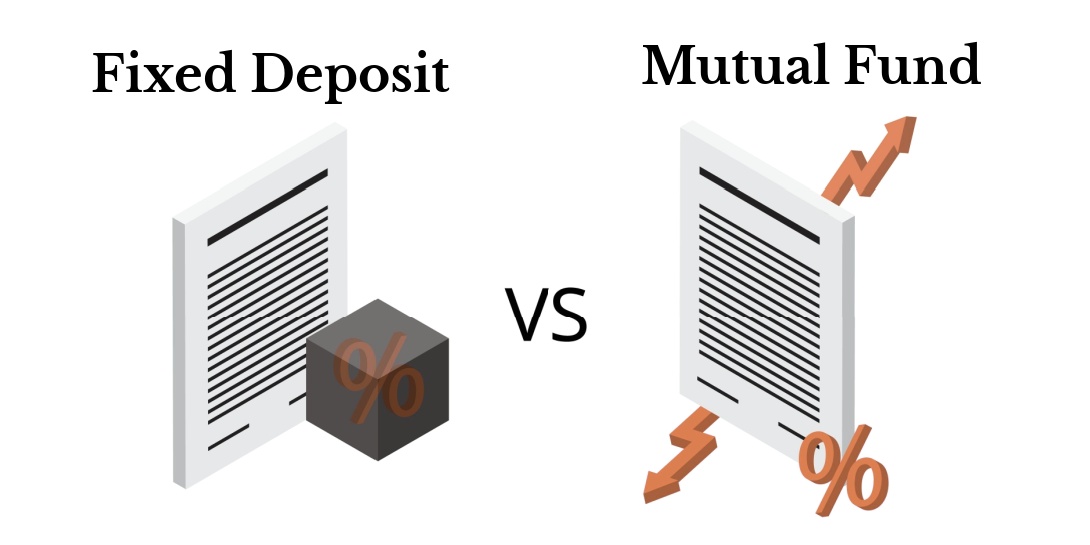FD vs MF: Key Differences Between FD and a Mutual Fund

For decades, fixed deposits (FDs) were the obvious choice for investors. Their stability and returns (higher than a savings account) appealed to the sensibilities of the previous generations. However, with the introduction of mutual funds, a lot of investors changed lanes. Today, FDs and mutual funds remain two modern financial tools. Find out the difference between FD and mutual fund and which of these is a better pick for you.
FD Vs Debt Mutual Fund: जान लें आपको किसमें INVEST करना चाहिए? @ICICIdirectOfficial
What is a Fixed Deposit?
An Fixed Deposit is an investment instrument that offers a fixed rate of interest for a fixed tenure. It is provided by most banks and NBFCs (Non-Banking Financial Companies). The interest rate is determined at the beginning of the tenure.
What is a Mutual Fund?
A mutual fund is a fund that pools money from various investors and invests in securities like stocks, bonds, etc. The returns are variable and distributed amongst all investors as per their investments.
FD vs mutual fund: What are the differences?
To know whether you should pick an FD or mutual fund, you should also know their differences. Here are 5 points of difference between FD and mutual funds.
|
Basis |
Fixed Deposit |
Mutual Fund |
|
Returns |
The rate of return for an FD is guaranteed, fixed, and can vary between 6 to 8% per annum. |
Rate of return is not fixed and varies on factors like the type of mutual fund, market performance, investment tenure, etc. |
|
Risk |
Due to guaranteed returns, the risk involved is nullable |
Offers varying degrees of risk depending on the asset class, investment term, and market fluctuations. |
|
Investment Process |
It can be opened with a bank or NBFC and one lump sum contribution is made at the opening time |
It can be opened directly with the mutual fund house or indirectly through a broker. They have two investment methods – Lump sum or SIPs |
|
Withdrawals |
Due to fixed tenure, any pre-withdrawals result in a penalty. |
These are highly liquid, and there are no penalties for early withdrawals. An exit load can be charged at the time of withdrawal |
|
Taxation |
The interest earned on the maturity of FD is added to investor's income and is taxed according to the applicable tax slab |
Tax is levied as per short-term capital gains or long-term capital gains on the investment made |
|
Impact of Inflation |
In the case of high inflation scenario, you may end up getting a negative return as the interest rate for an FD is decided at the time of its opening and remains unchanged |
Mutual funds can offer inflation-adjusted returns |
So, what should you choose: FD or Mutual fund?
Mutual funds can offer you inflation-adjusted returns and faster growth as compared to FDs. However, they come with risks. Although you can always choose the risk as per your suitability, there will always be some degree of risk involved with mutual funds. In con/trast, FDs provide you with stability and a guaranty, but the returns are low and eventually lose value compared to inflation.
Additional Read: 7 Reasons to Invest in Mutual Funds
Who Should Invest in a Fixed Deposit?
Fixed Deposits are ideal for those
- Investors looking for safe investment options with guaranteed returns
- Risk-averse investors who generally comprise of retirees and get good premium on the safety of their principal over higher returns
- Who have some short-term goal and wish to save for it without the fear of market fluctuations, as they are completely safe from market risks.
Again, investors seeking regular interest income may avail themselves of products with monthly, quarterly, or annual interest payouts. However, as mentioned earlier, the rates of return on FDs are relatively lower compared to those of riskier investment instruments, like stocks or mutual funds.
Who Should Invest in Mutual Funds?
They provide a flexible investment opportunity that each investor needs. They are perfect for those:
- Who wish to invest in the stock market but usually lack time and knowledge in picking individual stocks
- Investors who want to diversify their investment portfolio so that it comes with reduced risks. With various mutual fund types, there can be the kind of flexibility that investors need to match their composite risk tolerance.
Besides, mutual funds are one of the great choices for building wealth over the long term by the power of compounding.
Benefits of investing in fixed deposit and mutual funds
There are some distinct benefits to investing in fixed deposits and mutual funds. Fixed deposits offer a safe investment avenue coupled with guaranteed returns—a very important factor for investors who dislike risk and through whom stable income is expected. The returns on FDs are fixed at the time of investment, and the amount is completely secure, making it a very reliable way of meeting short-term goals or even for those who cannot stand market volatility.
On the other hand, mutual funds are a way to get into the stock markets with professional management that offers diversification, consequent risk reduction, and potentially higher returns as against FDs. They also aid in catering to all risk profiles, conservative to aggressive, being appropriate for long-term wealth generation and can be tailored according to personal financial goals and time horizons.
Conclusion
The right choice between FD vs mutual fund can be made after analyzing your own needs and financial objectives. Now that you know the difference between FD and mutual fund, you can make an informed decision.
Additional Read: Investing in mutual funds? Here's all you need to know
FAQs on FD vs Mutual Fund:
Is it possible to withdraw the FD amount before maturity?
Yes, you can withdraw your FD money early, but there might be a penalty fee. Banks charge a small fee for taking out your money before the agreed end date.
Can I open my FD online?
Yes, many banks now let you open fixed deposits (FDs) online! Just log in to your bank's website or app and look for the FD option. It's a quick and convenient way to start growing your savings.
Is FD better than sip?
FDs are safer and offer guaranteed returns, but SIPs have potentially higher returns over time. FDs suit short-term goals and low risk, while SIPs are better for long-term growth and those comfortable with some market ups and downs.
Which is the best FD scheme in India?
There's no single "best" FD scheme. It depends on your needs! Look for high interest rates, but consider factors like FD tenure, bank reputation, and any early withdrawal penalties. Research online or ask your bank for FDs that fit your goals.
 Top Mutual Funds
Top Mutual Funds








COMMENT (0)